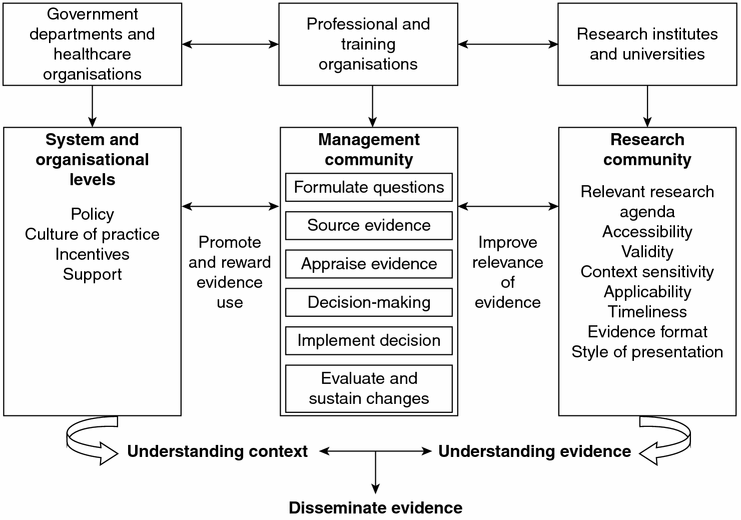- Evidence-based management
‘Translating principles based on best evidence into organisational practices’ (Rousseau, 2006, p. 256)
Studies have found that health service managers believe using evidence will improve management effectiveness (Adily & Ward, 2005; Liang, Howard, Leggat & Murphy, 2012), and most health service managers report a desire to use and apply evidence (Mitton & Patten, 2004). However, they make little regular use of evidence in their decision-making, especially neglecting scientific or research evidence (Liang et al., 2012; Lomas, Culyer, McCutcheon, McAuley & Law, 2005).
It is recognised that management research has had a much shorter timeframe than other areas of research (Axelsson, 1998), which has led to the dearth of robust evidence. In addition, there have been many articles written that outline the divide between those who use the evidence and those who produce the evidence, with suggestions that researchers need to better understand context and decision-making processes (Black, 2001). With an evidence-based approach there should be more demand for systematic research reviews and meta-analyses (Axelsson, 1998) that clearly describe what is known and what is still to be learned. A framework for improving the use of evidence in managerial decision-making is proposed by Liang et al. (2012). As outlined in Figure 23.1, the writers suggest roles for a range of players in the healthcare system.

Figure 23.1 Framework for improving the use of evidence in managerial decision-making. Z. Liang, P. F. Howard, S. G. Leggat & G. Murphy (2012). A framework to improve evidence-informed decision-making in health service management. Australian Health Review, 36(3), 287. doi: 10.1071/ah11051.
Managers and leaders should encourage an evidence-based organisational culture by asking for evidence and its potential application to their organisation. Recognising there is a long way to go to bridge the research–practice gap (Walshe & Rundall, 2001), managers should also participate in scholarly or scientific management research if invited to do so. Further, managers can capitalise on the supports offered by educational institutions to learn the skills and techniques to find, evaluate and apply their own relevant evidence.
It is clear that organisations must have a coherent approach if evidence-based management is to be embraced. This will encourage a significant power shift in organisations, replacing formal authority and opinion with facts and data (Pfeffer & Sutton, 2006). Organisational factors critical to the success of evidence-informed decision-making in health service management are supportive systems for access to evidence and information-sharing (Lavis et al., 2005), and provision of incentives to promote the use of evidence (Nutley & Davies, 2000). Shortell (2006) highlights the important role of health service boards in driving the necessary cultural change to implement such supportive organisational systems.
Frameworks for evidence-based management and leadership
In evidence-based management and leadership, managers and leaders need to formulate questions and then source and appraise the available evidence. This is then interpreted and used for decision-making, with implementation and evaluation following. This method is consistent with a report published by Barends, Rousseau & Briner (2014, p. 2), which suggests six steps to evidence-based management, to be taken
through the conscientious, explicit and judicious use of the best available evidence from multiple sources by
1 Asking: translating a practical issue or problem into an answerable question
2 Acquiring: systematically searching for and retrieving the evidence
3 Appraising: critically judging the trustworthiness and relevance of the evidence
4 Aggregating: weighing and pulling together the evidence
5 Applying: incorporating the evidence into the decision-making process
6 Assessing: evaluating the outcome of the decision taken.
Pfeffer and Sutton (2006) suggest that everyone in an organisation needs to take responsibility for the implementation of evidence-based management. They propose that managers ask for evidence of efficacy every time someone outlines a change. Managers should also ensure that decision-makers have all of the available supporting (and non-supporting) data.
Source the evidence
Managers should consider all sources of evidence, ranging from scientific to opinion or stakeholder evidence (Barends et al., 2014). It is important to acquire the best available evidence to address the issue at hand, while recognising that in most instances issues such as time and access mean that not all available evidence will be included in a review. Four specific sources of evidence, and questions to ask when considering them, are given below.
Scientific, scholarly or academic research findings
What has been studied, researched and established in peer-reviewed studies on this topic? Which databases should we search? What might a librarian be able to do to help us find out about this topic?
Stakeholders’ values and concerns
Who may be affected by this decision? Whose views are important when coming to this decision? Who should we involve in interviews or discussions about this topic?
Organisational data, facts and figures
What do we know about this issue within our organisation? What information and metrics are available to inform and support our decision-making? Which reports could we use or ask for that would help our deliberations about this topic?
Professional experience and judgement
Who has experience or expertise in this area, either within or outside this organisation? Who has experience or expertise in a similar area and therefore could usefully inform this decision? Who else might we discuss this topic with?
Stay updated, free articles. Join our Telegram channel

Full access? Get Clinical Tree


